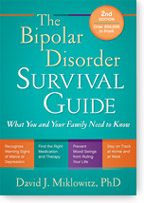The following is an excerpt from “The Bipolar Disorder Survival Guide, Second Edition” by David J. Miklowitz, Ph.D., Copyright © 2010. It is reprinted here with permission from Guilford Publications.

“I had always struggled with my periods, which birth control pills to take, and how I felt about my body when I was taking medications that made me look fat and feel stupid. But when I think back on my illness, my biggest struggle was when I had to decide whether to stay on my medications during my pregnancy.” — A 43-yar-old woman with bipolar I disorder
Many women with bipolar disorder worry a great deal about whether or not they should have children. In fact, there is every reason to have kids if you want them and are in a position, emotionally and practically, to raise them. One question that comes up time and again is if it is safe to take medication during pregnancy. Everyone’s circumstances are unique, so it is important to discuss your situation with your OB/GYN and your psychiatrist. Here are some helpful tips.
1. Don’t believe the myth that being pregnant will protect you against recurrences of mania or depression. In fact, pregnancy can be a high-risk time for relapse, a risk that is reduced substantially by staying on your mood stabilizers.
2. Most psychiatric medications pose at least some risks to the developing baby, but so does not taking medications. Untreated bipolar disorder carries significant risks, such as when a pregnant woman becomes manic and abuses her health by drinking or smoking heavily, driving erratically, forgetting prenatal obstetric appointments, and not eating regularly or getting enough sleep.
3. Beware of “alternative” treatments. Some doctors–and often friends or family members–will encourage you to replace your prescription medications herbal supplements, vitamins, or other over-the-counter compounds during pregnancy. Some vitamins, such as folic acid, are beneficial to the developing baby. But there is no evidence that “natural” compounds like St. John’s wort or valerian root can be substituted for lithium, the anticonvulsants, or the antipsychotics. Also, beware of the common assumption that over- the-counter medications are safer than prescription medications.
4. Exposure to only one medication is safer for the fetus than exposure to several different ones. If you are choosing between lithium and divalproex, lithium is generally considered to be safer. It’s generally better to stay away from antidepressants because of the risk of rapid cycling or mixed episodes.
(However, it may be better to stick with them if you’ve had a recent period of depression.) Consider the option of switching from an anticonvulsant (like divalproex) to an atypical or typical psychotic medication, such as quetiapine (Seroquel) or even the older drug haloperidol (Haldol). These may have lower teratogenic risk than the anticonvulsants.
As a woman, coping with bipolar disorder can be a difficult balancing act. Fortunately, effective treatment is out there. It is possible to have a healthy pregnancy without sacrificing your own emotional well-being. Remember that the most important thing you can do is always talk to your doctor about your specific concerns.
David J. Miklowitz, PhD, an award?winning researcher, is Professor of Child and Adolescent Psychiatry at the University of California, Los Angeles, School of Medicine, and Senior Clinical Researcher at Oxford University. He also directs the Child and Adolescent Mood Disorders Program at the UCLA Semel Institute. Dr. Miklowitz’s publications include the acclaimed book for parents The Bipolar Teen, and The Bipolar Disorder Survival Guide, Second Edition. He lives in Los Angeles.

